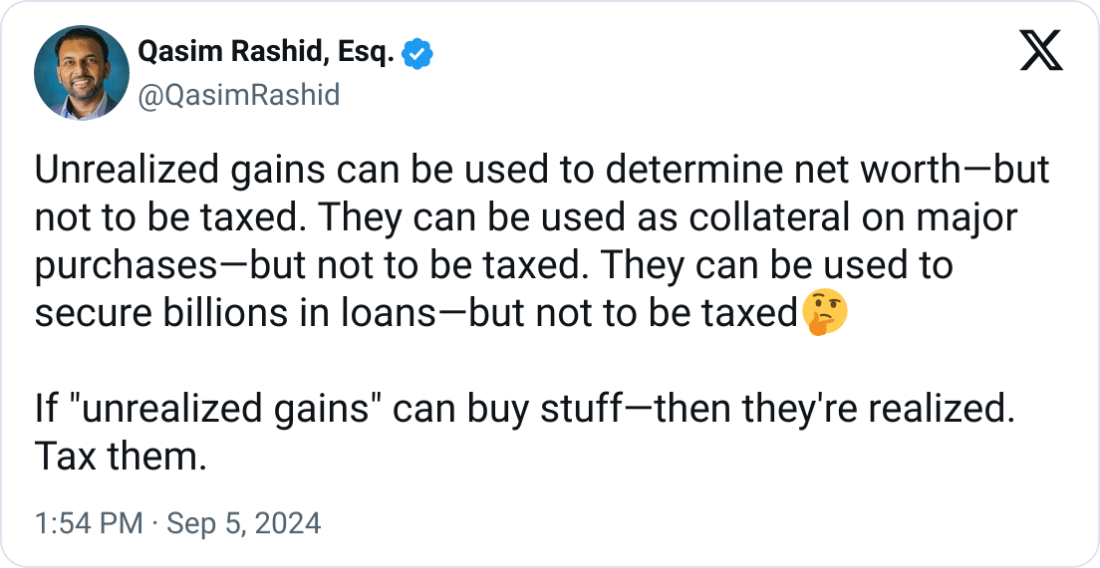this post was submitted on 19 Sep 2024
1599 points (96.8% liked)
Microblog Memes
6198 readers
3545 users here now
A place to share screenshots of Microblog posts, whether from Mastodon, tumblr, ~~Twitter~~ X, KBin, Threads or elsewhere.
Created as an evolution of White People Twitter and other tweet-capture subreddits.
Rules:
- Please put at least one word relevant to the post in the post title.
- Be nice.
- No advertising, brand promotion or guerilla marketing.
- Posters are encouraged to link to the toot or tweet etc in the description of posts.
Related communities:
founded 2 years ago
MODERATORS
you are viewing a single comment's thread
view the rest of the comments
view the rest of the comments

Realization is the establishment of value not sale for cash (it just happens that the most convenient establishment of value for any non-fungible asset is sale). There are already some realization events that don't have associated cash flows, to do with overseas assets or certain financial instruments. Ordinary people don't need to worry about this stuff, it's not for them, and if you're rich you can trivially figure out the cash flow issue.
But capital gains avoiding tax for the life of a wealthy person who lives off collateral zed borrowing, then being stepped up in basis for their heirs is just embarrassing for the US.
Absolutely nonsensical massive straw-grasp. If that was true, that would mean that everything that HAS a widely-established market price is instantly and permanently to be considered realized by everyone who owns it.
Relevant case law: "While it is true that economic gain is not always taxable as income, it is settled that the realization of gain need not be in cash derived from the sale of an asset" https://supreme.justia.com/cases/federal/us/309/461/
It is in fact true, and clearly then doesn't mean that at all. We can and do control what constitutes a realization event, and borrowing is a pretty sensible candidate. I don't know why you're losing you mind over this fairly prosaic idea.
You left out some pretty important context in that quote to make it seem like it's saying that realization is arbitrarily decided. In truth, all this is saying is that realization is not confined to reception of cash itself:
As it says at the end there, the ways to realize gain all necessarily entail "profit". A loan is not profit, nor is an already-owned asset transform into profit when used as collateral.
The above could absolutely not be used to support your argument, nor refute mine--not when you read it honestly and in context.
The capital gain is the profit, the collateralized lending is the transaction completed to realize that profit. It's a logical extension of accepted understandings of those terms and easy to imagine coherent legislation to implement.
You don't like the idea, that's fine. But it's simply not true to claim that it doesn't make sense and you haven't been able to articulate any inconsistency. Just saying "nuh uh that's not profit" is pointless. We all know it doesn't constitute realized gain in the existing system of laws, but OP and others are suggesting it would a be a sensible way to tax the extraordinary benefits that the ultra-wealthy take from their appreciated assets. It's been explained to you politely and with sources, if you have nothing more serious to add to the conversation I'm done giving you the benefit of the doubt.